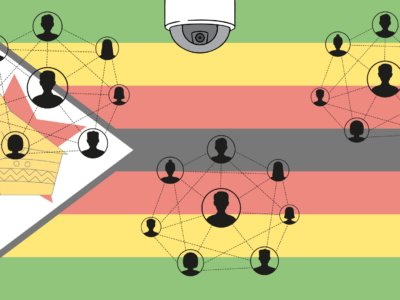Stories about Privacy
Unfreedom Monitor Report: Myanmar
Advox research into digital authoritarianism in Myanmar is now in a report. Read an excerpt and download the full pdf.
Unfreedom Monitor Report: Cameroon
Advox research into digital authoritarianism in Cameroon is now in a report. Read an excerpt and download the full pdf.
Why tech companies can no longer ignore their role in shaping politics and society
As the influence of tech companies continues to grow, it falls to civil society, journalists, tech users, and watchdog organisations to keep these firms accountable.
Venezuelan authorities spied on 20% of major telecom's clients
A major telecommunications company released a report giving evidence of privacy abuse on behalf of Maduro's government.
How Zimbabwe is building a Big Brother surveillance state
Citizens' belief that the infringement of human and digital rights does not concern them has created fertile ground for the emergence of pervasive surveillance in Zimbabwe.
New stringent legislation threatens data privacy and surveillance protection in Tanzania
A lack of data protection and privacy legislation leaves room for abuse in Tanzania.
The construction of the 5G network brings the demise of the Chinese domination in North Macedonia’s telecommunications
Despite the real concerns around privacy and espionage, and the often debunked viral concerns around 5G and health, the installation of a 5G network in North Macedonia continues without problems — for now.
Governments are still free to use the Pegasus software without human rights safeguards in place
There is an urgent need to regulate the global trade in surveillance technology with the inclusion of human rights safeguards.
Data privacy rights advance in Tanzania under new law, but obstacles remain
While the Data Protection Act offers in safeguarding the privacy of personal data, it raises serious concerns in key areas, such as security breaches and the independence of the Data Protection Commission.
Indonesia's new penal code revisions don't just threaten sexual freedoms
Indonesia's recent penal code revisions threaten journalists, free speech, bodily autonomy and more — severely undermining democracy in the region.
Activists strive for data protection in Indonesia
"... there is a long way to go to achieve stronger data protection in Indonesia."
The true colours of Truecaller in India: app accused of being negligent about data privacy
According to recently published research, the popular app TrueCaller is plagued with constant breaches and data security failures, and the company is avoiding regulations and taxes in India.
Can citizens of democracies still trust the law? A GV Insights discussion
The flip side of regulating the internet is that this enables the state to mobilise itself and erase the existence of these communities and their identities from popular culture and discussion.
Unfreedom Monitor report: Data Governance
Advox research on data governance as a tool of digital authoritarianism is now in a report. Read an excerpt and download the full pdf.
Unfreedom Monitor report: Morocco
Advox research into digital authoritarianism in Morocco is now in a report. Read an excerpt and download the full pdf.
The Greek spyware scandal: When technology outpaces governance
This ongoing scandal in Greece highlights an issue that all countries are grappling with: the regulatory mechanisms meant to safeguard civilians’ digital rights have not kept up with the times.
Unfreedom Monitor Report: Egypt
Advox research into digital authoritarianism in Egypt is now in a report. Read an excerpt and download the full pdf.
Policing the pandemic: Australia’s technology response to COVID-19
Australian governments approached the use of digital technologies from an ideological perspective, heavily leaning on control and surveillance.
Unfreedom Monitor report: Tanzania
Advox research into digital authoritarianism in Tanzania is now in a report. Read an excerpt and download the full pdf.
Unfreedom Monitor report: Zimbabwe
Advox research into digital authoritarianism in Zimbabwe is now in a report. Read an excerpt and download the full pdf.




















